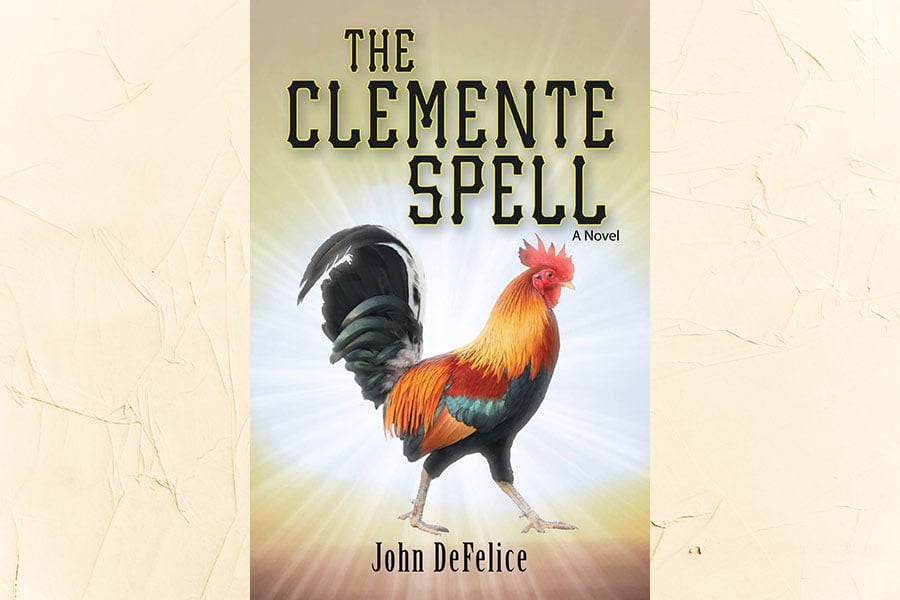Local author pens childhood memoir of struggle, hope, and triumph

Cover image of The Clemente Spell by John DeFelice.
“The Clemente Spell” by John DeFelice. Trilogy Christian Publishing (Tustin, CA, 2022). 496 pp., $27.99
First-time author John DeFelice, a long-time parishioner of St. Bartholomew Parish in Fort Worth and current resident of St. Francis Village in Crowley, has recently written “The Clemente Spell,” a mostly true memoir of growing up in the 1960s in an Italian immigrant family in West Virginia.
In the book, he recounts his struggle to overcome childhood trauma — including abandonment by his father, his mother’s undiagnosed mental illness, poverty, and a tragic family secret — by holding onto the dream of playing professional baseball like his childhood idol, Pittsburgh Pirate superstar Roberto Clemente. His Catholic faith, a strong work ethic, and tenacious hope get him through the difficult decision to give up his dream of being a Major League Baseball player.
Although his problems are substantial, DeFelice includes many relatable details of childhood: using a powerful imagination to make sense of the confusing adult world; the desire to fit in at school; sibling rivalry and revelry; and unsuccessful efforts to win the heart of the latest girl to catch his fancy.
The author, who teaches history and social studies to Crowley ISD high school students, sat down with the North Texas Catholic to answer a few questions about his book. Editor’s note: This interview has been edited for clarity and brevity.
NTC: You labored nine years over this book, mostly during the summer break between school years. What motivated you to write this book?
DeFelice: Well, I had such a crazy family; I just had to record this. My journey was not easy. I wanted to write a book where if someone is in pain or if they suffered pain, they would know there’s only one answer: to know Jesus Christ.
NTC: The Catholic Church is a constant in your childhood, even as you moved from town to town and your mother worked long hours to support the family. How did your Catholic faith become an important part of your identity?
DeFelice: Going to church was not an option. We always, always went to church. When we moved back to be near my mom’s mom, the church was maybe a little less than a mile, but we would walk to church. That ingrained in me that this must be pretty important.
NTC: And you never got angry with God about your struggles?
DeFelice: I always had that sense that things were going to be okay. It’s just a miracle, you know.
NTC: Romans 8:28 states, “And we know that in all things God works for the good of those who love him, who have been called according to his purpose.” Are there difficult experiences from your childhood that you now see that God has been able to use for a good purpose?
DeFelice: Does He make good come out of it? Yeah, I think so. I’ve worked with at-risk kids for years and years. I try to tell them that gold comes out of the ground, and it’s purified by heat. I tell them that everything we go through is making us stronger, making us pure.
And I try to tell kids I have this path that I’ve followed. It was pretty rocky, but I look at where I am now. Why, why would I want anything to change? That was part of my journey, but look where I am.
NTC: Life with your immediate family was often painful, but you had good role models in several teachers and coaches, Uncle Bob, who repeatedly advised you to keep your nose to the grindstone, and Roberto Clemente. How did they help?
DeFelice: When I grew up, my family wasn’t dysfunctional. No, we tried for years to get up to that level and we couldn’t reach it. But God sends you people.
Clemente was supernatural. Say the other team hit the ball and it bounced off the fence, and he picked it up. He could turn and throw the ball to home plate without the ball hitting the ground. Wow.
He was amazing. He died helping people, earthquake victims. And he was just a really good person. I picked a good hero.
NTC: You played football and wrestled, and your favorite sport was baseball, of course. In what ways did sports help give you direction?
DeFelice: The baseball coach said, “What are you gonna do when the ball’s hit to you?” You’ve got to know where [the play is], you can’t wait.
That’s how I learned about life. In other words, you can’t wait until the ball is hit to you. I analyze all the different options.
NTC: The book has so many details, from conversations, to your inner thoughts, to history and play-by-play on sports. How true is the book, and did you have to do a lot of research?
DeFelice: One thing I learned along the way was, with historical fiction, you research as you go along. My great-grandfather, the crazy one, I didn’t know what he did in Italy. So I had to crack the story. Rene [his wife] and I, we were fortunate, we went to a genealogy center in Salt Lake City and I found court documents and ship manifests.
NTC: Is that where you learned the truth about your great-grandfather?
DeFelice: There were stories. I didn’t know it was as bad as it was.
NTC: As the book concludes, I was struck by how much gratitude you have in your life, for your wife, your family, your career. Tell me how you’ve been able to thank God for the good things, and not get mired down in blaming Him for the bad things.
DeFelice: I think it’s God. In other words, it’s just recognizing God’s blessings, including the pretty incredible people He’s put in my life.
